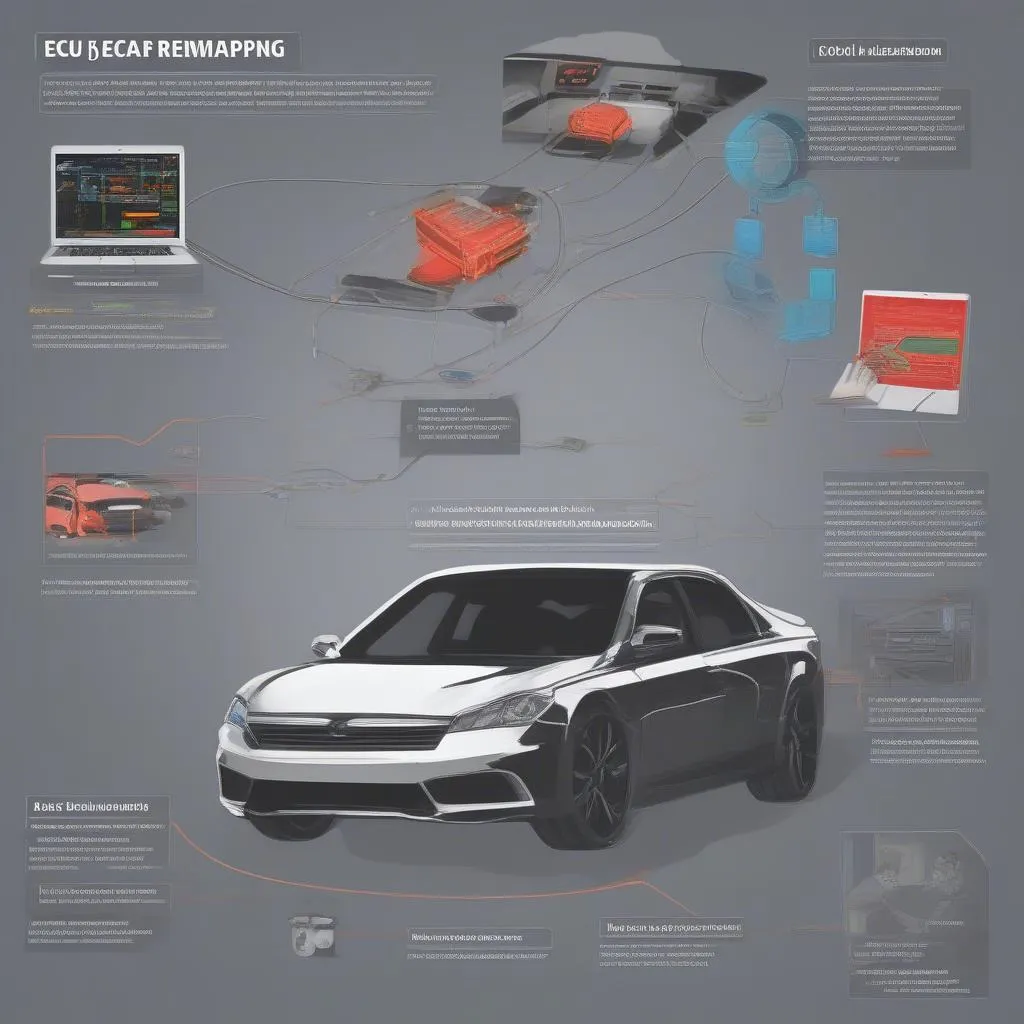Remap OBD2, also known as ECU remapping or chip tuning, has become a popular way to enhance vehicle performance. This process involves modifying the engine control unit (ECU) software to adjust various parameters, ultimately aiming for increased horsepower, torque, or even fuel efficiency. While the concept sounds simple, remapping your OBD2 system comes with its own set of considerations and potential risks.
Understanding OBD2 and ECU Remapping
Before diving into the intricacies of remapping, it’s crucial to understand the underlying technology. Your car’s OBD2 port, typically located under the dashboard, serves as a diagnostic interface. It allows mechanics and enthusiasts to access the ECU, the brain of your engine management system.
The ECU constantly monitors and adjusts various engine parameters like fuel injection timing, air-fuel ratio, and ignition timing based on pre-programmed maps set by the manufacturer. Remapping essentially means overwriting these factory settings with new maps tailored to modify performance characteristics.
Benefits of Remapping Your OBD2 System
Many car owners are drawn to OBD2 remapping for its potential to:
- Boost Horsepower and Torque: Remaps can unlock hidden power and torque reserves in your engine, leading to a noticeable improvement in acceleration and overall performance.
- Enhance Throttle Response: By optimizing ignition timing and fuel delivery, remapping can make your engine feel more responsive to throttle inputs.
- Improve Fuel Economy: Contrary to common belief, some remaps can improve fuel efficiency, especially in diesel engines, by fine-tuning the air-fuel mixture and other parameters.
- Customize Driving Experience: Remaps can tailor your car’s performance to your preferences, whether you prioritize aggressive acceleration or a smoother, more economical drive.
Potential Risks and Considerations
While the benefits may sound enticing, it’s crucial to approach OBD2 remapping with caution.
- Warranty Implications: Remapping can void your vehicle’s warranty, especially if it’s not done by a certified professional or if the remap is detected by the dealership.
- Engine Wear and Tear: Aggressive remaps that push the engine beyond its intended limits can accelerate wear and tear on engine components, potentially leading to costly repairs down the line.
- Legal and Insurance Issues: In some regions, significant performance modifications resulting from remapping may affect your car’s legal roadworthiness or insurance premiums.
- Finding a Reputable Tuner: Opting for a poorly executed remap from an inexperienced tuner can lead to performance issues, engine damage, or even compromise your vehicle’s safety systems.
Is OBD2 Remapping Right for You?
The decision to remap your OBD2 system is highly personal and depends on various factors, including your:
- Car Model and Age: Older cars might have limited remapping options and potential risks associated with age-related wear and tear.
- Driving Style and Needs: If you primarily use your car for commuting and prioritize fuel efficiency, a mild remap focusing on economy might be suitable. However, performance enthusiasts might opt for more aggressive tunes.
- Budget: Remapping costs can vary widely depending on the car model, tuning complexity, and the tuner’s reputation. Factor in potential maintenance costs associated with increased engine stress.
FAQs about Remap OBD2
Can I revert to the factory settings after remapping?
Yes, in most cases, you can revert to the original factory settings. However, it’s best to consult with your tuner for specific instructions and potential implications.
Will remapping affect my car’s emissions?
Remapping can affect emissions, particularly if the tune alters the air-fuel ratio significantly. Ensure the remap complies with your region’s emissions standards.
How much horsepower can I gain from remapping?
Horsepower gains vary depending on the engine, car model, and the type of remap. Generally, expect a 5-15% increase for naturally aspirated engines and a potentially higher gain for turbocharged engines.
Making an Informed Decision
Remapping your OBD2 system can be a powerful tool to unlock your car’s performance potential. However, it’s crucial to weigh the benefits against the risks carefully. Consult with experienced tuners, understand your car’s limitations, and prioritize reputable providers who prioritize safe and reliable performance enhancements.


